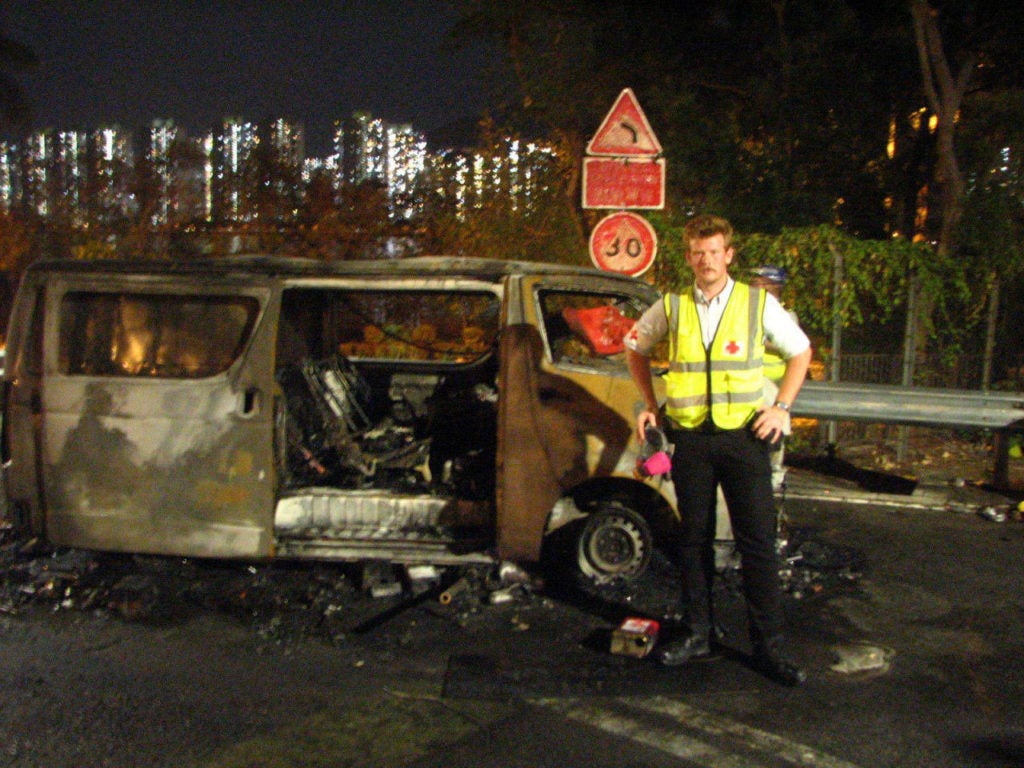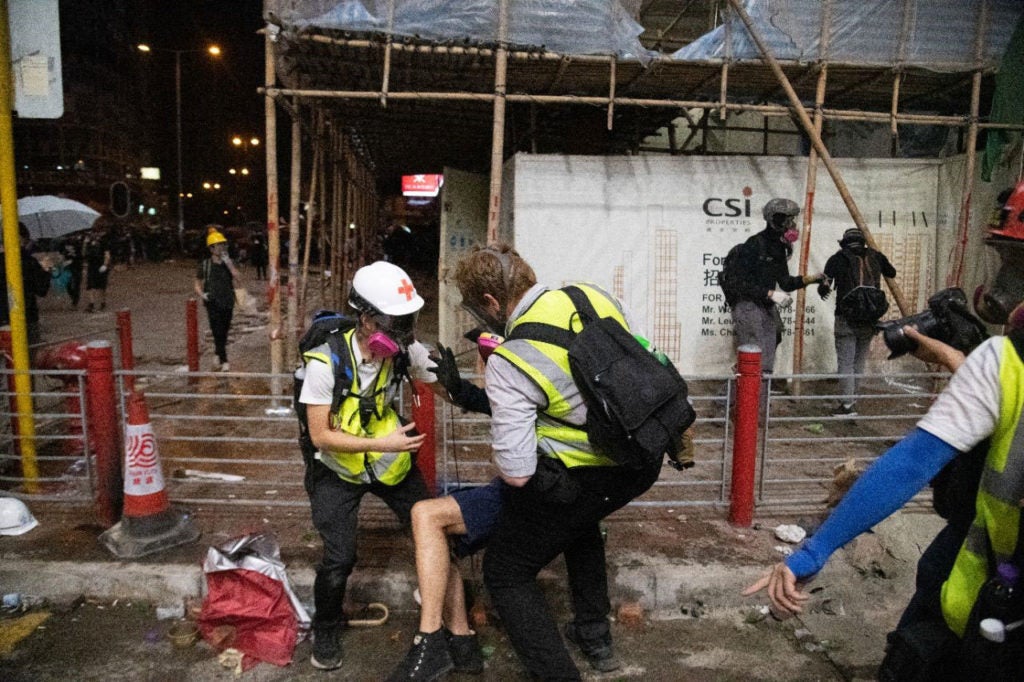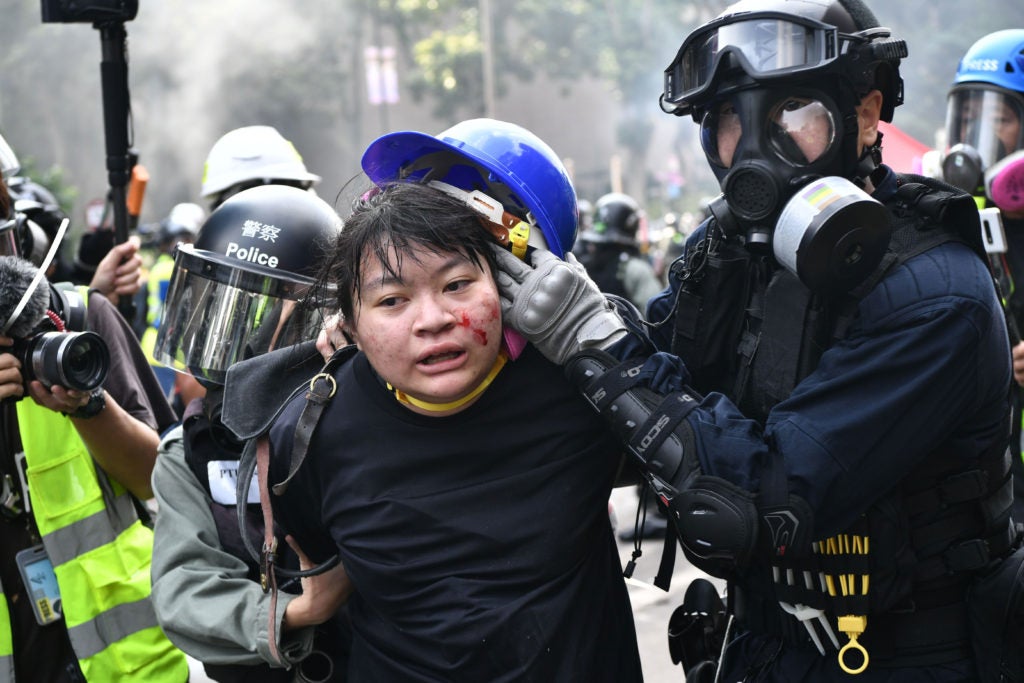An American Went to Help Hong Kong's Protestors. This Is What He Saw.
"They're willing to die."
How will it end? I mean … China is their enemy, really. So it’d be a very hard battle to win, but a bunch of scrappy colonials beat the biggest army and navy back in the 1770s, so possibly they have a chance. And now with the Senate passing the Hong Kong Human Rights and Democracy Act, I think they have a lot more of a chance.
del Guidice: So why did you decide to go to Hong Kong and get involved in the first place?
Howdeshell: Just watching it on the news and seeing what was going on. Being from the [United] States where we have a lot more freedom than Hong Kong, but I think we have a lot fewer people that are willing to put literally their lives on the line for it.
There’s a lot of chest-beating and plenty of people that’ll say, “Oh, I’ll die for my freedom, come and take it,” etc. But at the end of the day, the reality of what it would be like to actually defend your freedom with your life I don’t think is really appreciated.
And so here, like I said, at the time it was a bit more peaceful, but they were still definitely putting not their lives on the line, but they were putting their freedom on the line, because they could get arrested. They’re putting their money where their mouth was essentially.
Also, you never know what is true and what isn’t in the media these days, especially when it’s coming from a place so far away. And so, one of the main reasons was if I’m on the ground, I can see for myself what is happening and not have any doubts about what is true and what is false.
And two, well, I just wanted to be involved and help out in some way. I mean, it’s an opportunity of a lifetime to actually be able to get on the ground and help people that are fighting for freedom and liberty. So here we are.

del Guidice: Have any of the protesters that you’ve met or treated stood out to you in particular?
Cody Howdeshell: Oh, they all stand out, especially—so we have what we call the front liners. And these are the guys that are actually holding shields on the front line, protecting the ones behind them from the rubber bullets and the tear gas.
And I should point out, the tear gas is meant to be fired near a crowd. The gas is meant to go into the crowd and then it’s supposed to disperse them through just the negative effects of the gas. But the police have begun using tear gas canisters like bullets. They shoot them at the protesters, they’re flying at a very high velocity and they’re so hot, they’re using Chinese-made tear gas now. And these canisters are so hot that they actually melt into the asphalt roads when they land.
So these front liners who were 16, 17, 18, 19 years old, you see a few 20-, 21-[year olds]. But I’d say the average age is around 18, between 18 to 20. They have an amazing amount of courage and bravery.
I’ve got a few friends here now that participate in the front lines and the fact that they can go out every day when the news is filled with reports of their comrades being arrested, being mercilessly beaten, being abused in jail, or just disappearing, the fact that they can read that and then still go out and continue to fight is astounding.

del Guidice: So The Guardian recently published an editorial saying, “On Monday, the People’s Daily, the mouthpiece of the Communist party, warned that there is ‘absolutely no room for compromise.'” And I’m curious, Cody, what you think. Do you think this is how the protesters feel as well that … they’ve come this far and there is no room for compromise?
Howdeshell: I would say so. I think before the ceases of the universities, perhaps they would have had room for a little bit of compromise. But now after witnessing the police brutality and the action at the universities, realizing just how far the Communist party is willing to go, and just how many lives, humans it is willing to destroy for its goals, they’re willing to die for this, absolutely.
And we saw kids coming out of Poly University trying to escape in the last few days. One ran across the roof of a covered foot bridge, and when he came to the end, he was surrounded by police waiting on the ground. There was no way out for him. And he basically delivered a short speech saying that he would die for freedom, then he jumped down. The police grabbed him immediately.
Others that are still inside the university—and there have been possible opportunities for surrender that would result in arrest, but certainly somewhat safer arrests than having the police storm the university to take you—they have come out and released a statement saying they will not surrender, no matter the cost. They will remain at the university and they will fight until the end. They would rather die than go to prison under a communist regime.

del Guidice: That is … just incredible to see this happening in today’s day and age. I’m curious, were you there at Hong Kong Polytechnic University? And have you seen personally all of the action that’s been happening there? Or have you just heard from others what’s been going on at that particular university?
Howdeshell: No. I’ve been in three universities. So we started out spending 48 hours in City University where no one knew which university would be attacked first.
We arrived at City University actually due to a miscommunication, the City University and this Chinese University, both of Hong Kong and both abbreviated CUHK. We went to the wrong CUHK and arrived there while the students were just beginning to fortify the university.
We’ve watched that happening, waiting for the police to attack for 48 hours and when the police didn’t attack it looked as if they would. During that time, that was the siege of Chinese University. That’s pretty well covered, at least in the news here now, and I’m sure you easily find information on it.
After City University, we went to Chinese University, and we were there for a little under 48 hours, probably there 36 hours.
We got there in the morning. We stayed overnight and we left late the next night, early in the morning. We were in Chinese [University] when the last of the protesters that were holed up in there decided to retreat and go to Poly University to just make their final stand there with the other students.
We were on the bridge when they detonated the very amateur vehicle-borne IED. It was very amateur and I believe that was on purpose. It’s a university, they have chemistry students. I’m sure they could make quite an explosion if they wanted to, but it was pretty contained.
We then left there and we went to Polytechnic and were there for 48 hours. We were there during the clashes with the police, the long drawn out battles with the police, lots of people getting hurt, casualties, tear gas being fired, like I said, as [the] actual canister itself being the weapon and the ammunition rather than just the gas.
We were there when a student shot a police officer through the leg with an arrow and then late in the evening on the second day we were the last first aid team—and not just our team of Americans, but about us for Americans, an American pastor, and probably 20 local Cantonese first aid. We were the last group to be able to get out and walk by the police without being arrested. They offered basically a short window of amnesty for the first day.
Others stayed behind and tried to get out maybe 30 minutes after us, but they were immediately arrested I think because only 30 minutes after we left an … armored personnel carrier rushed the barricade the students had built on the traffic bridge into the university and the students were able to just make enough direct hits with Molotov cocktails that they destroyed, absolutely destroyed, the APC.

